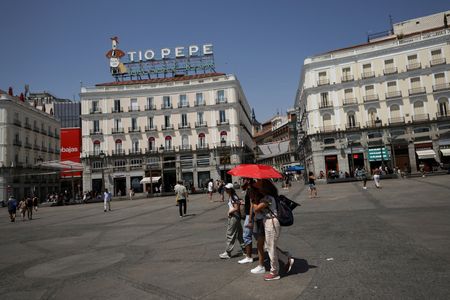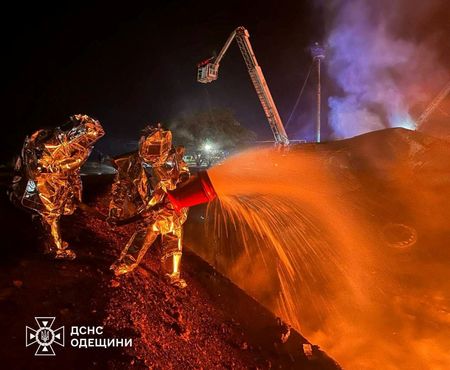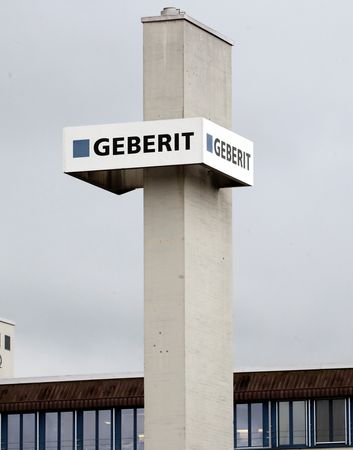By Charlie Devereux and Michael Francis Gore
MADRID (Reuters) -As Madrid sweltered at the peak of one of Spain’s longest-ever heatwaves, the temperature on a street in one of its poorest neighbourhoods – Puente de Vallecas – measured 41.4 degrees Celsius (106.5 Fahrenheit) by early afternoon.
A few hundred metres down the street it was 38.6 C.
The difference? One section of the street was treeless while the other was shaded by a row of leafy mulberries.
According to scientific studies, trees can play a key role in mitigating the often-deadly effects of heatwaves and as temperatures in Spain rise as a result of global warming they may play a crucial role in helping to regulate temperatures.
However, activist groups say that Madrid has been losing tree cover, particularly in some of its poorer neighbourhoods, and are pushing the mayor to plant more.
“The difference between having or not having trees on your street has an immediate impact on your health,” said Manuel Mercadal, a member of activist group Sustainable Vallekas, which has been measuring temperature differences on Vallecas’s streets to raise awareness.
San Diego, a part of Puente de Vallecas, registered some of the highest temperatures in Madrid, according to a Polytechnic University of Madrid study, which identified so-called “urban heat islands” where temperatures were as much as 8 C higher than in other parts of the city, such as parks.
The heat is exacerbated by a lack of air conditioning because many households can’t afford it, said Pablo Chivato, a coordinator of the neighbourhood association for Puente de Vallecas.
More frequent heatwaves are taking their toll on elderly patients, especially those with underlying cardiac problems, said Antonio Cabrera, a family doctor at a primary care centre in La Elipa in southeastern Madrid.
“Higher mortality rates were traditionally associated with winter in European countries. Nowadays, for people aged 80–90 with multiple health conditions, this is the time of year when many of them die,” Cabrera said.
TREE CLASHES
As temperatures rise, trees have become a political issue. Madrid’s Mayor Jose Luis Martinez-Almeida has clashed with activists over trees since taking power in 2019, particularly over plans to cut down more than 1,000 trees for the extension of a metro line.
Official data show that while the total number of trees has increased by 2.4% under Almeida’s watch, that was mostly in the expanding middle-income districts in the city’s east. All except one of the southern districts lost trees.
Puente de Vallecas has lost 1,314 trees or 3% of its total tree cover since 2019.
Some of the loss was caused by a heavy snowstorm in 2021 that killed 80,000 trees. But many are also felled as the city embarks on construction projects.
“Madrid is one of the most tree-lined cities in the world. This contributes very positively to mitigating the heat island effect,” the environmental department at the mayor’s office said, adding that it had increased its budget for maintaining and improving green spaces by 40%.
Left-wing party Mas Madrid has pledged to plant 75,000 more trees so that the city has one tree every seven metres (23 feet).
The law used to stipulate that felled trees must be replaced, but a recent reform means local councils in certain circumstances can create a fund into which to pay what it would have cost to plant new trees, said Lola Mendez of the environmental group Ecologists in Action.
Almeida’s office said it has planted nearly 40,000 trees in empty tree pits under a plan announced in 2022.
Data published by the city in 2023 showed 1,318 trees were planted in Puente de Vallecas, but that 719 empty tree pits were covered over. The city said it couldn’t provide more recent data.
Chivato said his neighbourhood association worked with the mayor’s office to plant trees in 75% of empty tree pits in the Puente de Vallecas neighbourhood of San Diego. But many remain empty.
(Reporting by Charlie Devereux and Michael Francis Gore; additional reporting by Antoine Demaison; Editing by Sharon Singleton)









